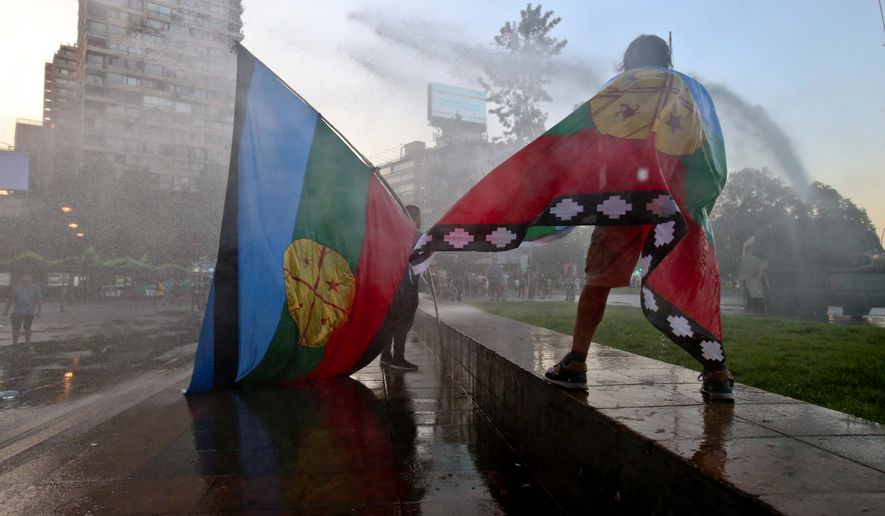Chile’s new conservative President Sebastian Pinera is introducing counterterrorist measures to crack down on an Indian rebel movement in southern Chile and terminate an indigenous land transfer program which some presidential aides call a “fraud.”
The crackdown is just one sign of a major change for this South American country, as Mr. Pinera, a billionaire investor with holdings in financial services, transportation and even a soccer team, reclaimed the presidency after four years under leftist President Michelle Bachelet.
Mr. Pinera’s agenda, which includes tougher standards on immigration and regulatory overhaul to boost the mining industry and attract new foreign investment, has been compared to the approach President Trump has taken in rolling back programs favored by his liberal predecessor.
The election is just the latest swing in an unusual political pendulum here, where consecutive presidential terms are not permitted under the constitution: Ms. Bachelet served as president from 2006 to 2010, only to give way to Mr. Pinera in 2010. Four years later, Ms. Bachelet won back her old job, only to see Mr. Pinera stage a comeback of his own in December’s election, beating Ms. Bachelet’s preferred successor.
Getting tough on what the government sees as an illegal separatist movement is a necessary first step in changing Chile’s course, government officials say.
“We plan highly complex prosecutions focused on terrorist actions and [have formed] a specialized anti-terrorist group in our police to be more effective in our response and achieve better results than we have had until now,” new Interior Minister Andres Chadwick said following a visit to the Araucania region where Mapuche Indian radicals are calling for a separate state.
Just last weekend, insurgents ambushed a convoy of 16 trucks transporting lumber along an isolated highway, burning most of the vehicles and their cargo in what has become routine occurrence in the region where such strikes have almost averaged one per day.
Mapuches are the original inhabitants of southern Chile who fought European colonizers for centuries following the arrival of the Spanish in the 16th century. The Costa Rica-based Inter-American Court of Human Rights has recognized Mapuche claims over the southern half of Chile and called on the government in Santiago to return the land.
While a slight drop in the volume of attacks has been detected this year, according to the Araucania business association, armed teams of up to a dozen men have become more destructive, causing record losses to local businessmen.
The owner of a company that leases logging equipment to tree farms said that he has lost 40 percent of his machinery in arson attacks during recent by groups known as Organizations of Territorial Resistance (ORT) which also go by various Mapuche tribal names.
They are also burning Christian Churches for offending their animistic beliefs, according to Mapuche online propaganda. Five Catholic churches were torched when Pope Francis visited the region in January to appeal for peace in the conflict by Chile’s archdiocese.
Left-wing academics accuse President Pinera of seeking to “militarize” the conflict in Araucania while ignoring its cultural and social dimensions. “What’s needed are social and integral economic measures not more police,” said University of Chile law professor Gonzalo Medina.
Economic aid
Mr. Pinera has pledged to invest in infrastructure and development projects in Araucania. Chile’s poorest region. But he is also shutting down a government land bureau called CONADI that has been managing land transfers to indigenous communities.
Ms. Bachelet, whose center-left coalition ranged from Christian democrats to communists, accelerated land transfers to Mapuches through a system that boosted “conflictive communities.”
Chile has one of Latin America’s most advanced business environments, boasting the region’s lowest corruption index. But the land transfer scheme has come to resemble state-subsidized racketeering enforced by ethnic violence, according to Felipe Silva, a lawyer for the trucker’s union.
As terror attacks escalated during Bachelet’s tenure, CONADI’s budget grew by 60 percent even as economic recession forced the government to cut spending in health and education.
Close aides to Mr. Pinera say that they have discovered cost overruns of over $20 million in recent land transfers to Mapuche communities, many of which are composed by no more than 10 people some of whom are not even indigenous, according to Andres Molina, a members of Congress and adviser to Mr. Pinera.
Counter-terrorist measures being contemplated by the new administration include the use of drones to keep watch on radicalized communities, according to security officials who speak of the need to enhance intelligence capabilities. Expanded witness protection programs and use of undercover informants are also among the measures being contemplated with a view to gaining more terrorist convictions.
More broadly, political analysts here see a rising number of political leaders in South America who are broadly sympathetic to President Trump’s agenda. Mr. Pinera and Argentina’s President Mauricio Macri are, like the American president, successful businessmen elected on a platform of boosting the private sector and reducing the role of the state in the economy.
“Like Trump, the recently elected presidents of Argentina and Chile, Mauricio Macri and Sebastian Pinera, are business moguls-turned-politicians who came into office praising the virtues of applying business strategies to the job of governing,” Omar G. Encarnacion, a professor of political studies at Bard College, in a blog post for Foreign Policy magazine this week. “This is a stark departure for Latin America, whose right-wing leaders have traditionally been military men on horseback.”




Please read our comment policy before commenting.